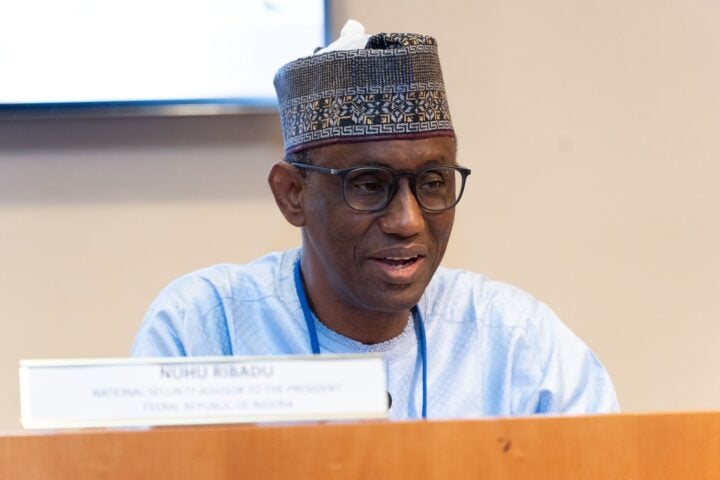BY ILERIOLUWA OLADIPUPO
In a country where nearly two-thirds of the population lives on less than $2 a day, rising food prices have become a quiet yet devastating factor in shaping the future of Nigeria’s children. Families already struggling to make ends meet are facing a growing nutritional crisis, leaving children at an increasing risk of malnutrition and other opportunistic diseases that beset poorly nourished young children.
According to the United Nations International Children’s Emergency Fund (UNICEF), 100 children under five years die of malnutrition in Nigeria every hour. This means Nigeria loses about 2,400 children to malnutrition daily. The data is even grimmer, considering that Nigerian children suffer more from the effects of malnutrition than the global average. As of last year, 35 million children under five years of age were malnourished, and the proportion of malnourished children increased from 9.3% to 15.9%.
Malnourished children are at risk of poor brain development, poor learning, emotional instability, low immunity and death, with the UNICEF saying malnutrition is a direct or underlying cause of 45 percent of all deaths of under-five children.
As the world rapidly globalises and competition becomes more intellectual and innovation-driven, a malnourished population risks being left behind. This raises troubling questions: what are the long-term effects of inadequate nutrition on children’s cognitive development? How does a lack of essential nutrients impact their ability to compete with their peers globally? How affordable is nutritious food in Nigeria? What steps are the Nigerian government and regulatory bodies taking to ensure that nutritional standards support cognitive growth in children?
Advertisement
The critical link between nutrition and cognitive development
Nutritional science has long established the relationship between early childhood nutrition and brain development. Children need diverse nutrients to build strong and healthy brains, particularly during the first five years of life, when cognitive foundations are laid. Proteins, fats, vitamins, and minerals like iron, iodine, and Omega-3 fatty acids are essential in developing their brain.
Protein, for example, is vital for producing neurotransmitters that regulate brain function, while iron is crucial for oxygen transport to the brain. Omega-3 fatty acids, commonly found in fish, are key to synaptic plasticity—the brain’s ability to adapt and change, which is fundamental to learning and memory.
A deficiency in any of these nutrients—especially during this period—can result in devastating long-term effects. Justin Forsyth, former UNICEF executive director, puts it succinctly: “If children are subjected to malnutrition at a very young age, the long-term impact on stunting brain development can be devastating. Stunting hampers not only the future ability of a child to learn and earn but also has an impact on the social and economic progress of the countries in which they live. It cuts school performance, translating into a reduction in adult income by 22 percent on average. It also leads to increased risk of health problems in adult life.”
Advertisement
The crisis of poor quality food among Nigerian children
The quality of food products available to Nigerian children is often questionable. Recent investigations by media outlets, such as Premium Times, have shown that much of the milk shipped into Nigeria is not milk. These so-called “milk” products are fat-filled, sugar-laden substitutes that do not meet international standards for nutritional content and are not classified as “milk” in Europe, where they are manufactured.
According to the report, some traders believe that Fat-Filled Milk Products (FFMP), unlike Whole Milk Powder (WMP), contain zero fat and were originally intended for children. But the report found this claim about fat content to be untrue, concluding that these products do not meet the nutritional needs of children.
Likewise, multinational corporations operating in Nigeria, such as Nestlé, have been scrutinised for unhealthy practices such as adding sugar to babies’ cereals. According to the Premium Times report, one of the company’s products in Nigeria had the second-highest sugar content against global standards. Sadly, the food available to Nigerian children is of poor quality, depriving them of essential nutrients.
Advertisement
The impact of financial constraints on child nutrition in Nigeria
Given these dire consequences, one might wonder why many Nigerian parents are not more aggressive in their fight against malnutrition. The inability of many Nigerian families to feed their children properly is not due to negligence but financial incapacity. They are too burdened by the prices to be concerned about quality. For example, the cost of baby diapers can easily exceed ₦10,000 per month for a single child. Also, a tin of baby milk costs more than ₦6,000, and most babies require several tins each month.
For older children, the situation is equally dire. Protein sources such as eggs, fish and meat—foods critical for brain development—are often unaffordable for low-income families. As a result, parents increasingly resort to carbohydrate-heavy diets for their children, substituting rice or cassava for the essential proteins their developing brains need.
Consequently, a family earning the old minimum wage of ₦30,000 is left with barely enough for food, transportation, housing, healthcare and education. With inflation rates around 32%, this amount barely covers the most basic needs. Considering a 2023 report by SBM Intelligence stating that most Nigerian families spend 97% of their income on food, it is no longer a mystery why Nigerian parents are unable to make healthy decisions for their children when overwhelmed by such financial constraints.
Advertisement
Child nutrition initiatives in developed countries and Nigeria
Many developed countries have long recognised the critical importance of child nutrition and have taken proactive steps to ensure that even the poorest children have access to high-quality, nutritious food.
Advertisement
For example, since 1946, the United States has operated a National School Lunch programme (NSLP), a federally-assisted meal programme in public and nonprofit private schools and residential childcare institutions. The programme provides nutritionally balanced, low-cost or free lunches to children each school day.
The Special Supplemental Nutrition Programme for Women, Infants, and Children (WIC) also provides federal grants to states for supplemental foods, healthcare referrals and nutrition education. It specifically supports low-income pregnant, breastfeeding and non-breastfeeding postpartum women, as well as infants and children up to age 5 who are at nutritional risk. In addition, food banks and community organisations distribute healthy food to families in need, while public health campaigns encourage parents to make healthier food choices.
Advertisement
However, there have not been adequate concerted efforts from the Nigerian government to proactively tackle the challenge of malnutrition among Nigerian children. The government launched the National Home-Grown School Feeding Programme (NHGSFP) in 2016, a promising initiative to increase school enrollment, boost local agricultural production and address child malnutrition. However, the programme’s reach was limited, and its implementation was plagued by inefficiency, inconsistency, underfunding and corruption.
The programme has now been suspended for over a year, yet many parents have been unable to fill the gap by providing their children with the necessary breakfast and school lunch. A teacher at a government primary school in Oyo Town, Oyo State, said: “The school feeding programme helped many parents. Many children don’t eat before coming to school, nor do their parents give them money to buy lunch. It has been tough for them since the government stopped the feeding programme. Imagine pupils in Primary One being asked to come and eat their first meal after school closes for the day. The government needs to do something urgently.”
Advertisement
The way forward
Nigeria’s malnutrition crisis is more than a public health issue—it is a national emergency. If left unresolved, the cognitive and physical damage caused by malnutrition will have long-lasting consequences on the country’s socio-economic development.
A generation of malnourished children will grow into adults with diminished cognitive abilities, poor health outcomes and lower economic productivity, further entrenching poverty and inequality. The already strained healthcare system will face additional pressure, as malnourished children are more susceptible to chronic diseases like diabetes, heart disease and mental health disorders later in life.
To ensure a healthier future, Nigerian policymakers must implement immediate and long-term interventions to reverse the current trend. First, they must enforce stricter regulations on food labelling and nutritional content. Mandatory disclosures of sugar and fat levels in baby foods and penalties for misleading packaging would empower parents to make informed choices about their children’s nutrition.
The government should also revive and expand the school feeding programme to include all primary and secondary school students. The programme must incorporate fruits, vegetables and diverse, healthy options. Local governments can help by providing raw, nutritious ingredients like millet, sorghum, barley and soybeans to mothers at primary healthcare centres, enabling them to prepare healthy meals for their babies. Religious organisations and communities can also provide children fruits, vegetables, and proteins.
This initiative should be paired with educational campaigns to teach parents about proper nutrition and avoiding substandard food products. Many parents, especially in rural areas, do not know what constitutes a healthy diet for children, leading to poor dietary choices. While breastfeeding campaigns have been widely successful, it is time to include the importance of balanced nutrition for infants, toddlers, and preschoolers. Schools can also mandate that parents place fruits in their children’s lunch packs from time to time.
Nevertheless, Nigeria cannot tackle this issue alone. The support of international organisations like UNICEF, the World Health Organisation (WHO) and the Food and Agriculture Organisation (FAO) is critical. These bodies can provide technical expertise, funding and policy guidance to help implement large-scale solutions. Collaborating with such organisations will allow Nigeria to adopt global best practices in combating malnutrition.
The question is no longer whether Nigeria can afford to address malnutrition—the question is whether it can afford not to.
Oladipupo works with SBM Intelligence
Views expressed by contributors are strictly personal and not of TheCable.
Add a comment










